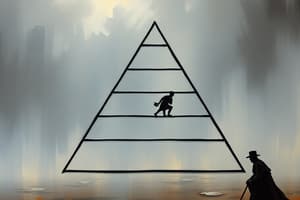Podcast
Questions and Answers
What happens during the exhaustion phase of ARE?
What happens during the exhaustion phase of ARE?
Time passes and no relief from stress, your body gets tired. Risk of illness, collapse, or death.
What is epinephrine?
What is epinephrine?
Stress hormone released by the adrenal glands.
What is norepinephrine?
What is norepinephrine?
Stress hormone released by the adrenal glands.
What are physiological illnesses?
What are physiological illnesses?
What is psychoneuroimmunology?
What is psychoneuroimmunology?
There are four types of lymphocytes: T _____; B ________; macrophage, and natural killer cells.
There are four types of lymphocytes: T _____; B ________; macrophage, and natural killer cells.
What are T lymphocytes?
What are T lymphocytes?
What are B lymphocytes?
What are B lymphocytes?
What are macrophages?
What are macrophages?
What are natural killer cells?
What are natural killer cells?
What is coronary heart disease?
What is coronary heart disease?
What is motivation?
What is motivation?
Which of the following are perspectives of motivation? (Select all that apply)
Which of the following are perspectives of motivation? (Select all that apply)
What does instinct theory propose?
What does instinct theory propose?
What is drive reduction theory?
What is drive reduction theory?
What does optimal arousal theory state?
What does optimal arousal theory state?
What is Maslow's hierarchy of needs?
What is Maslow's hierarchy of needs?
Define homeostasis.
Define homeostasis.
What is an incentive?
What is an incentive?
What is the Yerkes-Dodson Law?
What is the Yerkes-Dodson Law?
Define self-actualization.
Define self-actualization.
What is anorexia nervosa?
What is anorexia nervosa?
What is bulimia nervosa?
What is bulimia nervosa?
What does the term 'drive' refer to in motivation?
What does the term 'drive' refer to in motivation?
What is cognitive dissonance theory?
What is cognitive dissonance theory?
What are the three main types of stress?
What are the three main types of stress?
Define the concept of the general adaptation syndrome.
Define the concept of the general adaptation syndrome.
Study Notes
Motivation
- Defined as a need or desire that energizes and directs behavior towards goals such as food and social connections.
Four Perspectives of Motivation
- Instinct Theory: Focus on genetically predisposed behaviors.
- Drive Reduction Theory: Highlights how physiological needs create aroused tension, driving behavior to achieve homeostasis.
- Optimal Arousal Theory: Proposes that humans seek to maintain an optimal level of arousal, neither too high nor too low.
- Maslow's Hierarchy of Needs: Organizes human needs in a pyramid, with physiological needs at the base.
Homeostasis
- Describes the body's tendency to maintain a balanced internal state, essential for functions like temperature regulation.
Hormones Involved in Hunger
- Ghrelin: Secreted by an empty stomach, signals hunger.
- Orexin: Hunger-triggering hormone from the hypothalamus.
- Leptin: Secreted by fat cells to curb hunger and increase metabolism.
- PYY: Signals fullness to the hypothalamus.
Theories of Sexual Response
- Sexual Response Cycle Stages: Excitement, plateau, orgasm, resolution.
- Refractory Period: Recovery phase after orgasm where another cannot occur.
Sexual Dysfunctions
- Include erectile disorder, premature ejaculation, low sex drive, and female orgasmic disorder, all of which can cause distress.
Theories of Emotion
- James-Lange Theory: Emotions result from physiological reactions.
- Cannon-Bard Theory: Emotions and physiological reactions occur simultaneously.
- Two-Factor Theory: Emotions arise from both physical arousal and cognitive labeling.
Types of Motivation
- Intrinsic Motivation: Internal rewards such as enjoyment or satisfaction.
- Extrinsic Motivation: External rewards like grades or salary.
Conflicts in Decision Making
- Approach-Approach Conflict: Choosing between two desirable outcomes.
- Avoidance-Avoidance Conflict: Choosing between two unattractive outcomes.
- Approach-Avoidance Conflict: A single choice with both positive and negative features.
Stress
- Types of Stress: Include catastrophes, life changes, and daily hassles.
- GAS (General Adaptation Syndrome): Describes the body's response to stress in three phases: alarm, resistance, exhaustion.
Immune Response and Stress
- Psychoneuroimmunology: Examines how psychological factors influence the immune system and health.
- Lymphocytes: White blood cells involved in fighting infections, with T and B lymphocytes having specialized roles.
Health Implications
- Coronary Heart Disease: Leading cause of death in America, linked to stress and associated with Type A personality traits.
Conclusion
- Understanding the complex interplay of motivation, emotion, stress, and health can enhance psychological well-being and personal development.
Studying That Suits You
Use AI to generate personalized quizzes and flashcards to suit your learning preferences.
Description
Test your knowledge on motivation and its various theories with these flashcards from AP Psychology Unit 8. Explore concepts like instinct theory, drive reduction theory, and Maslow's Hierarchy of needs. Perfect for revision and mastering key psychological terms.




